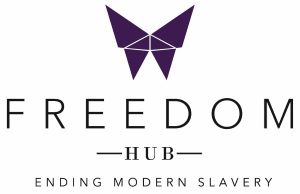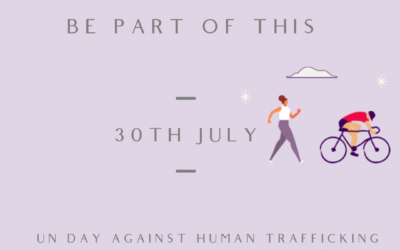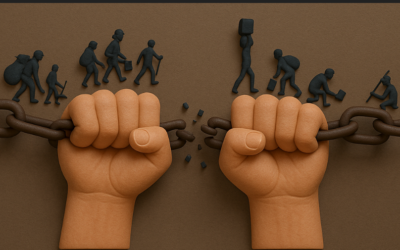Last week, we published an article discussing the significance of knowledge and education, emphasising its role in future advocacy and action. Now that we are (sadly) coming to an end in our 16 Days of Freedom series. Where we have introduced and discussed, in detail, various concepts surrounding the modern slavery issue. After providing the basic tools for education, we are now ready—and eager—to start the conversation and share our knowledge with others!
How the Modern Slavery Conversation Can Be Lifesaving
Because human rights violations like physical abuse, labour exploitation, or forced marriages are such sensitive and delicate discussions, there is often hesitation among individuals to have a real conversation about it. Unfortunately, this hesitation to have important discussions creates an entire line of consequences that ultimately fails to protect vulnerable groups and individuals. We can think of this as a kind of snowball effect:
Hesitation to talk about human rights violations out of fear, discomfort, or purposeful ignorance.
↓
Social stigma created and associated with these issues.
↓
Refusal to educate, teach, or discuss in public spaces out of fear of disrupting social comfort.
↓
Stereotypes about issues (particularly victims of these issues) are established as a result of the lack of public coverage and discussion.
↓
Bystander crowd grows larger and larger, leaving past, current, and future victims to fend for themselves as a result of being stereotyped and stigmatised.
↓
Amount of modern slavery victims increase because of unawareness and lack of societal support protection.
↓
The modern slavery chain expands, exploiting thousands of individuals every day without consequence.
Therefore, sharing what we have learned with those around us is an easy first-step toward breaking down the stigmas and stereotypes that surround tough subjects like human rights violations, which can ultimately help protect all victims of modern slavery.
One day, we hope to see this entire process and modern slavery as a whole completely eliminated. In order to make some progress toward this goal, however, we all must do our part.
Starting with starting the modern slavery conversation!
Doing Our Part—Right Now, Today
While there is no right or wrong way to begin the modern slavery conversation, below are some suggestions on how to introduce these important topics to those in your life:
- Share these 16 Days of Freedom articles—or any other relevant article, news segment, or social media post—to a friend, colleague, or family member! Ask for their thoughts and insights on it and share yours with them!
- Invite your loved ones to an event that advocates for or revolves around solving human rights issues!
- Bring someone you know and attend a class or workshop that helps spread crucial messages!
- Buy products from ethical shops & local businesses, show them off to your friends or give them as gifts! Explain to them why it is important to you to shop ethically and introduce the issue of forced labour and thus, modern slavery.
- Share, post, and follow advocacy accounts on social media! There are many ways to get followers to interact with you and your content, especially on Instagram. Create a poll, ask a question, or include a hashtag in your Instagram stories.
Written by: Charlene Moraleda
Pic: @christianwinklercreative
Want to help Make a Difference NOW?
High Teas for Humanity – Celebrate freedom on Human Rights Day (10th December) by coming to our High Tea or you could run your own high tea and fundraise for victims of violence in slavery in our Survivor School.
End of Year Giving – purchase from our shop and know that 100% of the profits from your purchase supports victims of violence in slavery in our survivor school.
Join our Community
Help raise awareness and join a local volunteer team, contact us here.
Or if you would like to get our monthly update, opt-in here.
If you would like to support a survivor, donate here. (tax-deductible)




